Practicing Harp Happiness
#242: My New Vocabulary for 2026
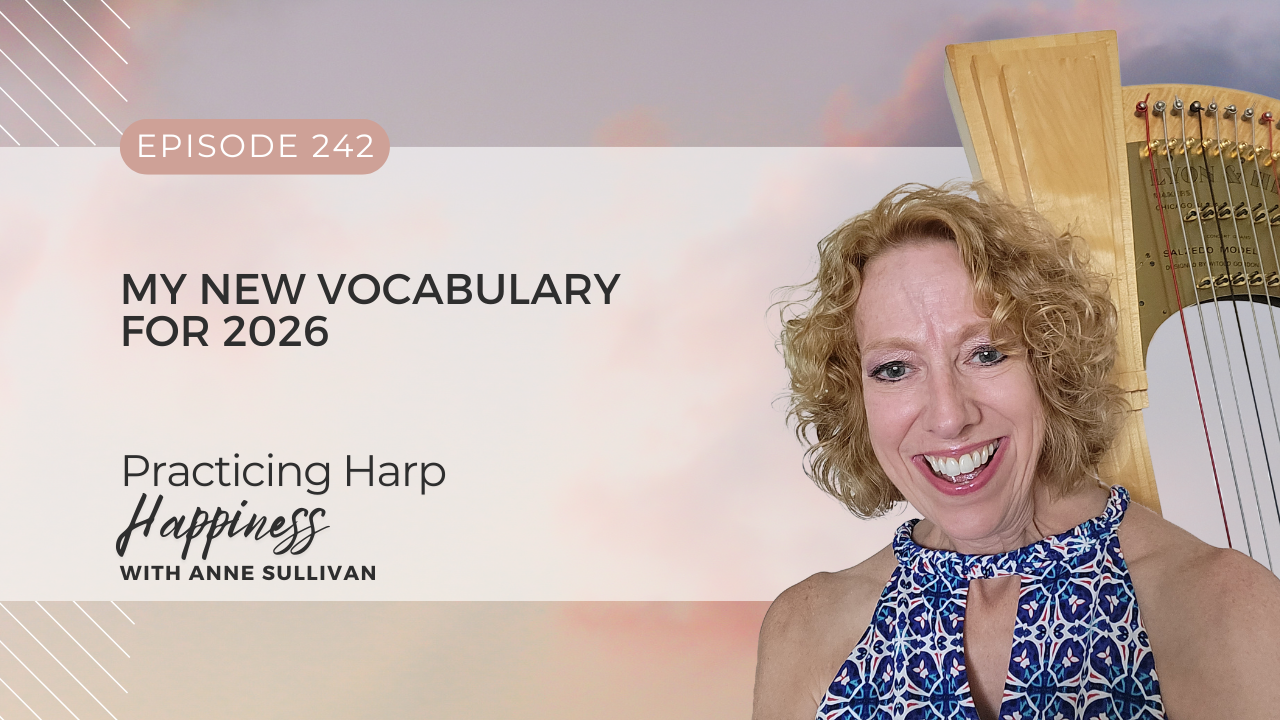
For me, and I think for many people, this last week of the year is a supremely hopeful one. The rush to get ready for Christmas is behind us and the promise of a new year is finally in focus. We’re faced with possibilities for a change, instead of pressure.
I realize, of course, that for many of us those possibilities for the new year include uncertainty, worry and fear which are beyond any assistance I could give on this podcast. I can merely offer prayers that the universe grants us all the courage and resources we need to face the circumstances before us. And I will stick to what I know best, how to help you find more meaning, joy and fulfillment in your harp playing,
It has become a fairly wide-spread practice at the beginning of the year to choose a word or a phrase to be your touchpoint throughout the year, to inspire you, motivate you and keep you focused. As I was thinking through my word for 2026, I realized that many of the words I have been using frequently in my teachi...
#240: Classics for a Relaxing Holiday
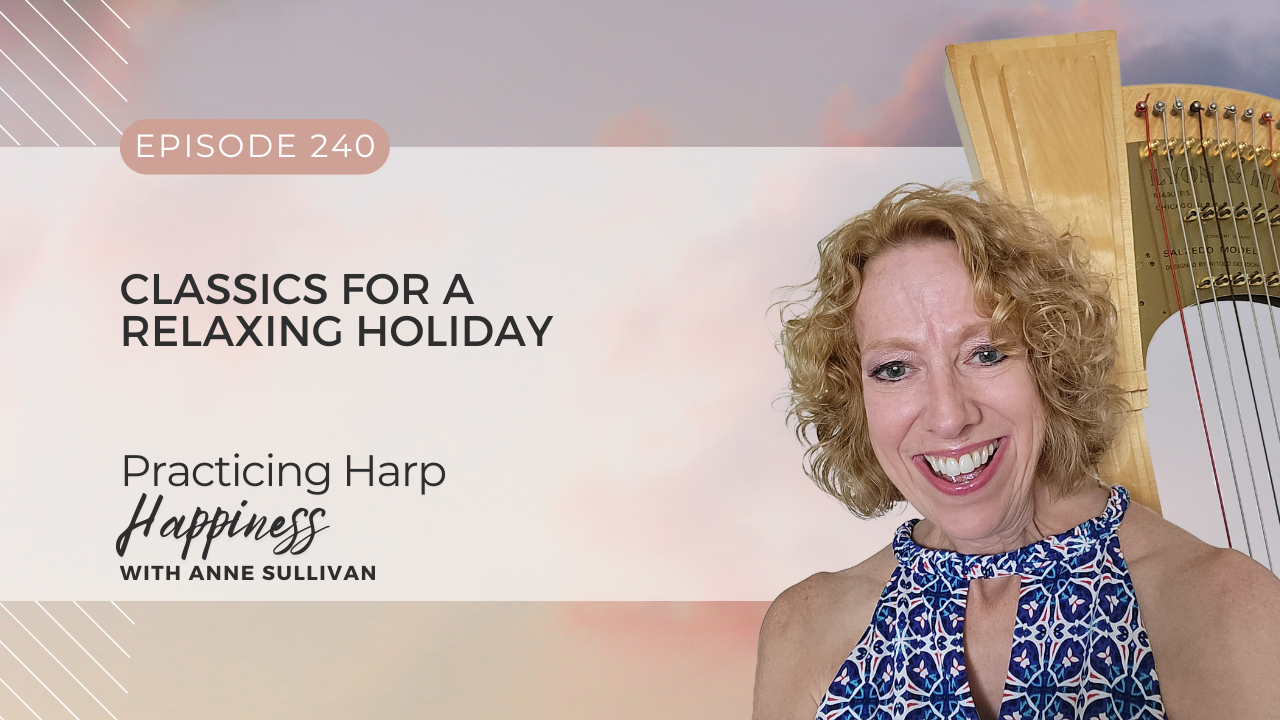
It’s Christmas week, and for me, this is a week to finally settle into the holiday mood. This is the time we decorate our tree, get in touch with friends and family, and start reveling in the spirit of joy and peace that feels so elusive other times of the year.
So this is not the week I want to dive into a heavy teaching topic here on the podcast. What I want to do today is spread a little holiday harp happiness with a short musical program for you to enjoy.
The theme of the program is “Classics for a Relaxing Holiday,” classical music that is appropriate for the holidays, but isn’t specific to this time of year. In other words, no jingling bells or Santa Claus songs - just calm, perhaps even meditative harp music, assembled from my various recordings and videos.
I’ve listed the program in the show notes, and for some of the pieces, you’ll also find links to sheet music arrangements in our Harp Mastery® shop. I’ve also included spoken introductions to each piece to give you a ...
#239: The Stories Behind the Songs: Three Carols Revisited
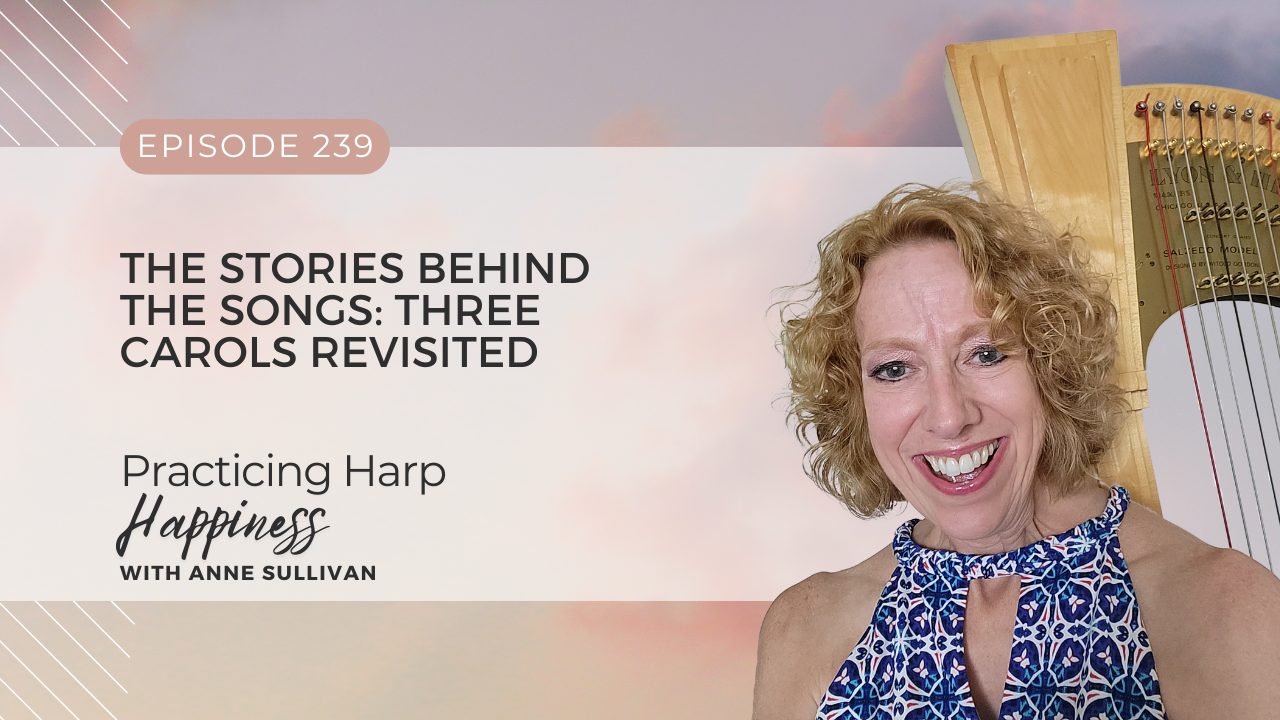
I’m kind of a Christmas carol geek, if there is such a thing. I’ve always enjoyed playing them and even as a young person, I was fascinated by where they came from: their origins, translations, composers, text sources, etc. For me, the stories behind the carols were a kind of history and geography lesson rolled up into the magic and meaning of Christmas.
I think the origin stories are what really held my interest. The writing of “Silent Night” because a church organ in Austria was damaged, or the composition of “O Holy Night” as a dedication piece to a renovated organ in France are stories that aren’t just interesting, though. They shape how I think about those songs and how I play them, certainly how I arrange them as well.
Today, I want to share the back stories to three carols. I know you’re familiar with these carols, but you may not be familiar with their origin stories. If you’re like me, you love hearing insider scoops and these are back stories you probably won’t hear anyw...
#237: Music Angels: Leah Kim and the Transformative Power of Music
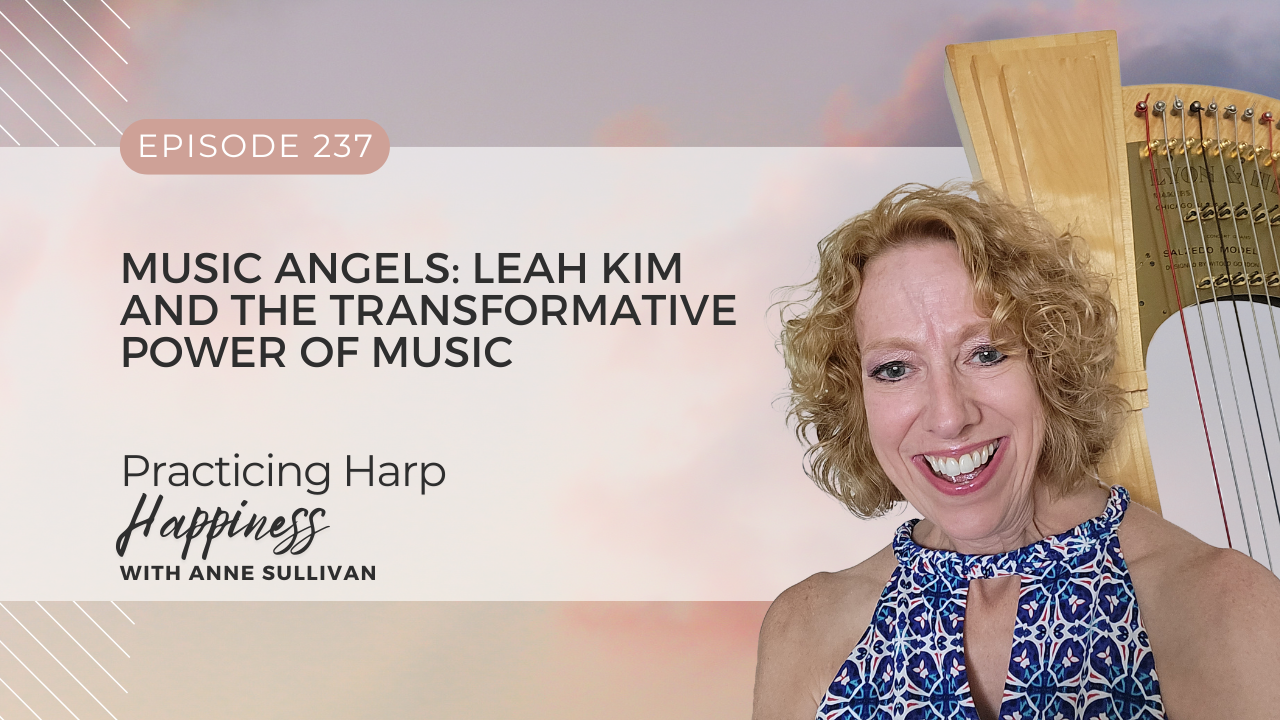
I don’t do very many interviews on this podcast. I started the show as a way to help harpists with their learning and I wanted, and still want, to be able to use this podcast to teach, to encourage and to inspire harpists all over the world.
But over the last year, I have realized that there are other voices I want to be sure that you hear. After all, learning comes in many forms and hearing a variety of voices and viewpoints enriches us and our harp playing in so many ways. So during 2026, one of my objectives is to bring you into conversations with harpists, musicians and others who inspire me. These are people I want you to meet, even if it’s only in this podcast format, because I want to share the inspiration that they have brought me with you.
So today, I want to introduce you to a new friend of mine, Leah Kim. Leah is a violinist and her story starts in South Korea. Her story is truly an awe-inspiring one, and as you will hear, she shared a lot of it in our conversation. Si...
#235: Where Harp Beginners Go Wrong - and Maybe You Do Too
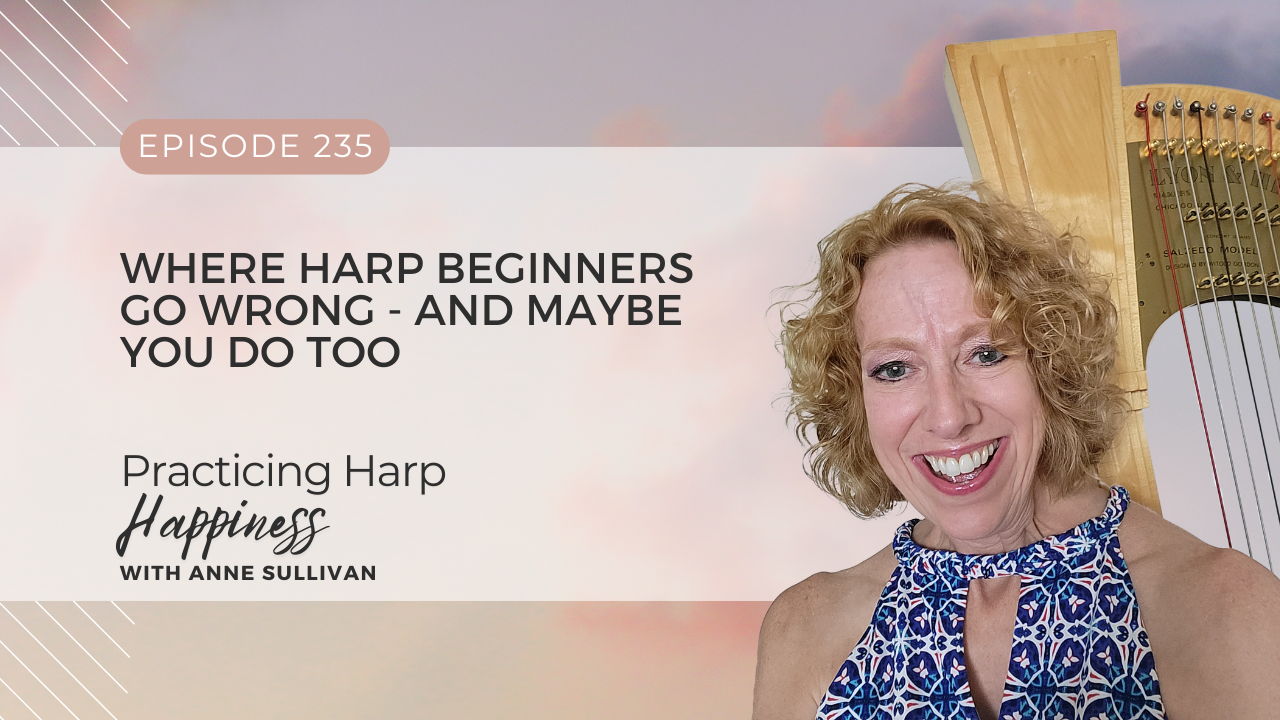
I know what I’m going to talk about with you today could be controversial. It could sound totally off target to you. Nevertheless, I hope you will hear me out.
I want to share with you why and how I think most harp beginners start wrong, even if they are working with a teacher. It isn’t exactly that we teachers aren’t teaching the right things or that we aren’t dedicated to the success of the students who are trusting us. It’s that the path we walk with them feels so slow.
Every individual comes to the harp with a unique skill set and level of musical experience, with their own learning style and level of commitment. But each student comes to the harp with the same objective: to play music on the harp. That’s why I started the harp, and it’s almost certainly why you did too.
So today I want to talk about the things that hold beginners back, that keep them from making the progress they want, from playing the music they want, in a timeframe that feels right to them. Most of these...
#232: Starting a Piece? Don’t Take It From the Top
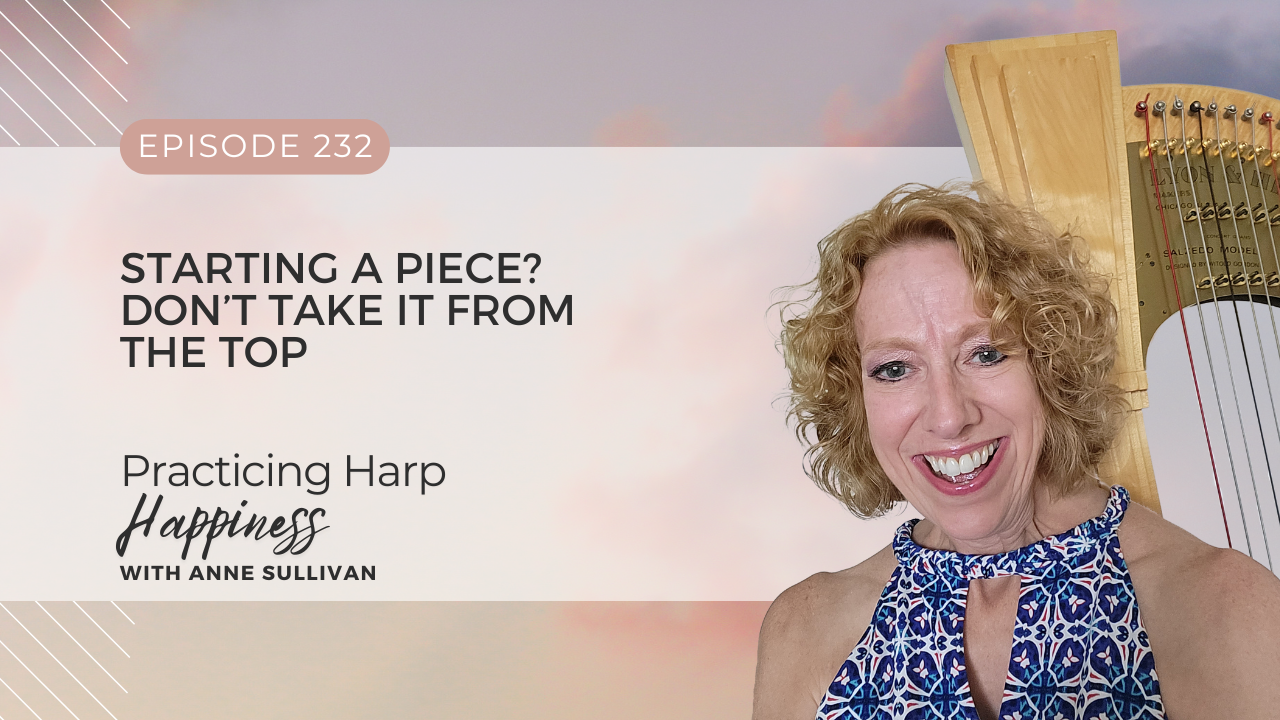
So you decided to learn a new piece for the holidays - good for you! When I think of all the years I’ve been playing the harp, it’s a little amazing that I still feel a little thrill when I pick up a new piece of music to learn, and I’m sure you feel the same. Starting a new piece is a voyage of discovery with the promise of adventure, new notes to conquer, a few challenges to meet along the way, and finally, a beautiful piece of music we can play.
Of course, the voyage is often a little rougher than we anticipate. It can take longer than we thought and can be more discouraging. We can’t always eliminate the difficulties or estimate exactly how long it will take us to learn a piece. However, we can give ourselves the biggest advantage we can by getting the strongest and fastest start we can to the piece.
One of my frustrations with the way harp learning is often taught is that it teaches the student to be slow. Certainly playing slowly and learning carefully are necessary to devel...
#224: Teacher to Student: If I Knew Then What I Know Now
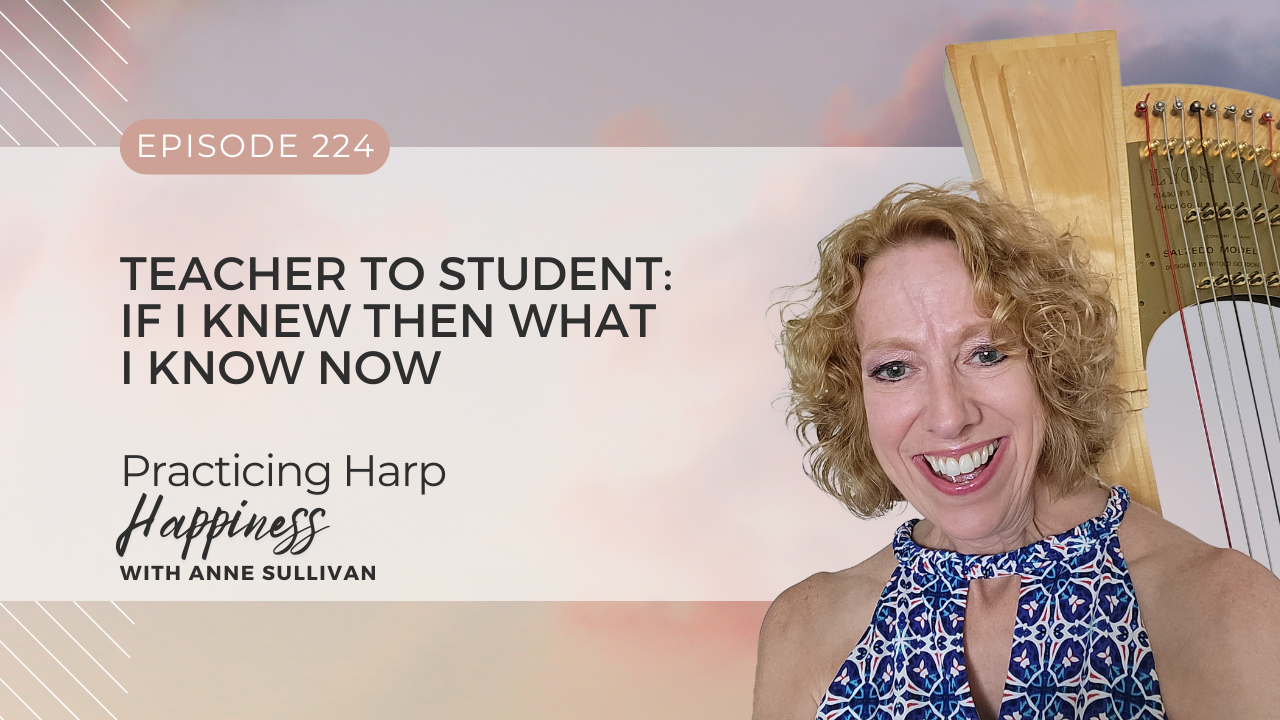
How often do we say, “If I only knew then, what I know now”? Sometimes it’s about life experience, like surviving teenage drama. Sometimes it’s about turning down an opportunity, like not buying stock in Facebook before the company went big.
Obviously, we aren’t able to go back in time and really have a “do over.” I imagine that if we could, It’s more than possible that the result wouldn’t be what we expect. We can never know how our world would have been altered, if we’d taken the other fork in the road. We can only guess.
Here’s my “if I only knew then” statement for today: If I only knew as a young harp student what I know now as a harp teacher. The fact behind this is key. The fact is that everything I learned about being a good student, I learned from trying to be a good teacher. If I had known as a student even half of what I’ve learned through my teaching, my harp life might have been so much easier.
Most teachers of any subject will tell you how much they learn from t...
#222: Susann McDonald: A Legacy of Connection
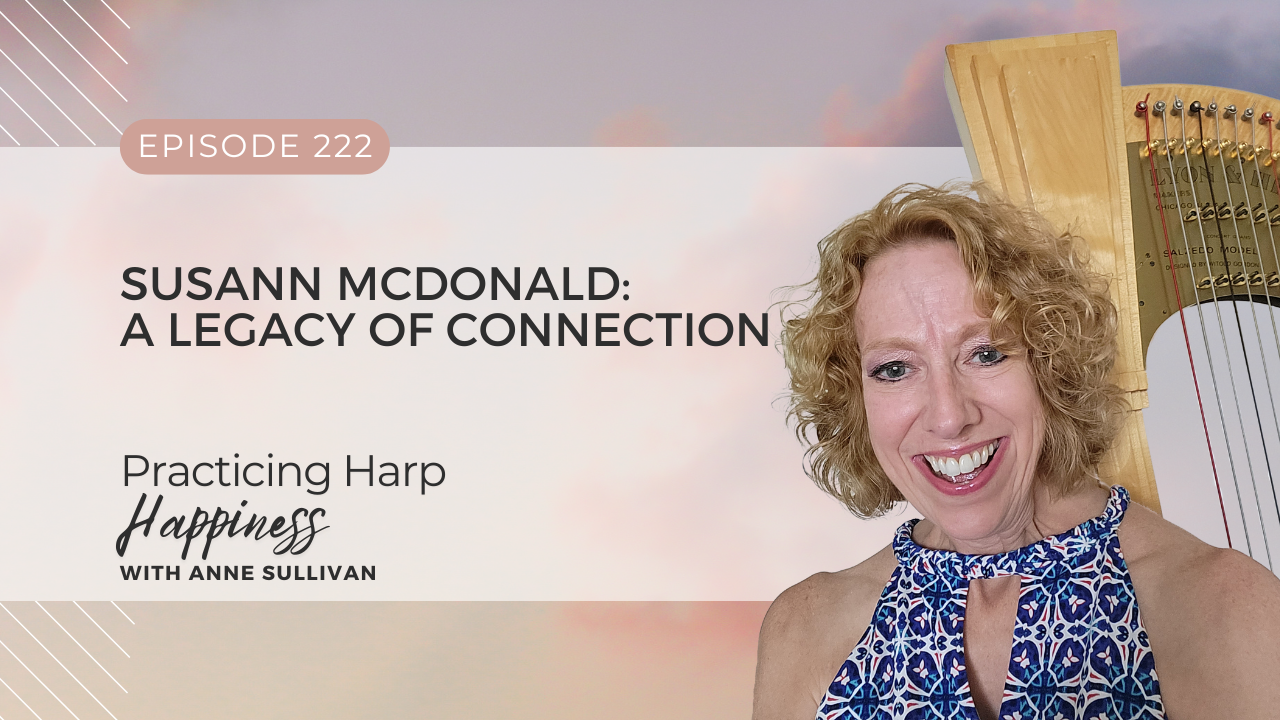
There’s a moment — sometimes only after someone is gone — when we finally see the full measure of their influence. We may have known they mattered, but loss has a way of sharpening our perspective, of showing us just how much they shaped our world.
Some people use the word legendary too easily. For harpist Susann McDonald, it’s no exaggeration.
Susann McDonald, who passed away this past May at the age of 90, left an indelible mark on the harp world. She was an acclaimed performer, a respected author, an extraordinary teacher, and a passionate advocate for our instrument. She co-founded the World Harp Congress and nurtured a global community of harpists, uniting people across continents through music.
But her story is more than a list of titles and accomplishments. It’s about the way she created a sense of belonging — for every harpist, no matter your style or skill level. Whether you play concert halls or in your living room, her influence has touched you. And today, we’ll celebr...
#220: 5 Things Your Teacher Can’t Do For You - and 5 Things She or He Can

You’ve heard me say this before: I had wonderful teachers throughout my musical life. From my very first piano teacher when I started piano at age four, through my harp studies from age eight and my college years at the Curtis Institute, my teachers were all I could have wanted. They nurtured me, encouraged me, pushed me, and took me to task when that was required, and believe me, it was required from time to time. Most importantly - and this is one of my core teaching principles to this day - they were as invested in my musical journey as I was. They took my learning and my musical growth personally, not as a reflection on them, but as a mission that mattered to them because my music mattered to me.
It would be easy to say that they were the inspirations for my own teaching path, but truly, the path itself showed up more or less by accident. But as is the case with so many blessings, it showed up when I needed it and led me in directions I could never have expected. At each step a...
#218: What Makes Any Piece a “Harp Piece”?
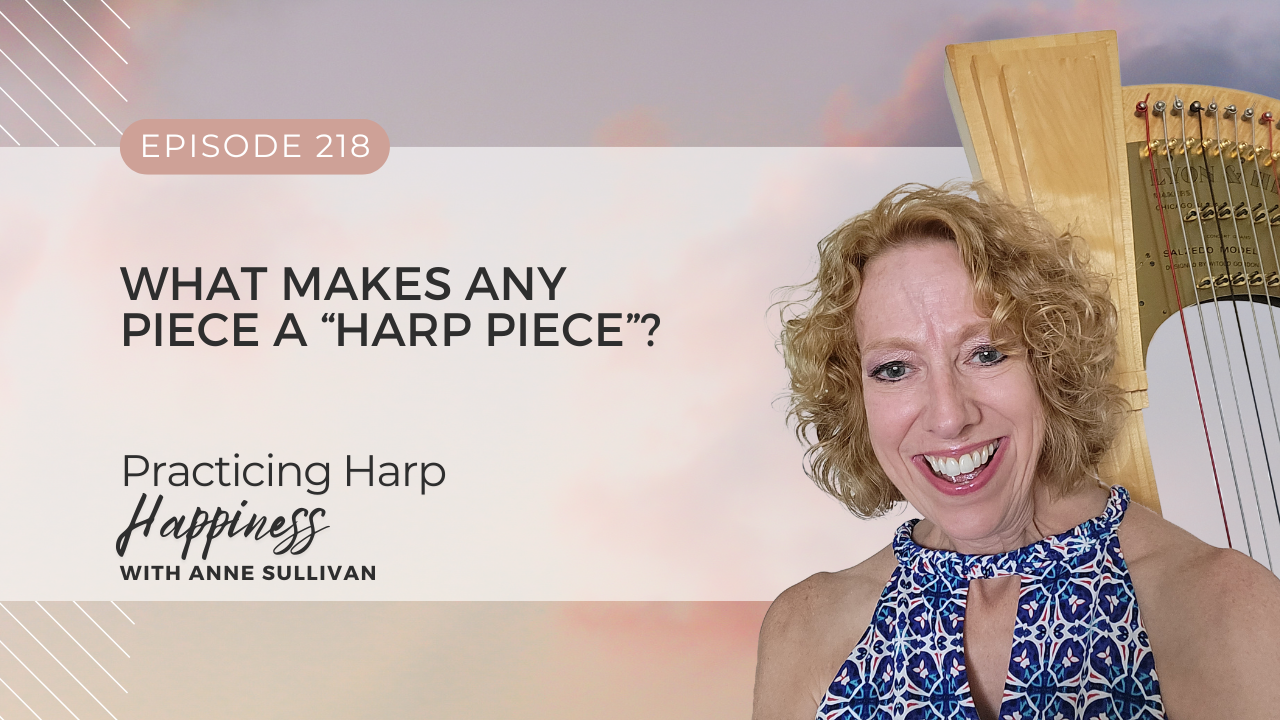
Here’s our question for today: what makes a piece of music a “harp piece”?
Does it have to have been originally written for harp? Or composed by a harpist? Or could any piece of music, no matter what instrument or instruments it was written for, be a harp piece if you play it on the harp?
I happen to think that the third answer is the correct one. Mostly. Let me explain.
If you play a piece on the harp, it has absolutely become a harp piece whether it started out that way or not. But that doesn’t necessarily mean that it should have become a harp piece. Some pieces just don’t work on the harp. Take the “1812 Overture,” for example. This piece was written by Tchaikovsky to commemorate Russia’s victory over Napoleon. It’s 15 minutes long, It requires a full symphony orchestra (minus a harp), an additional brass band, a bell carillon and a battery of cannons - yes, cannons. How could a single harp play a meaningful rendition of this monster work? You could play some of the themes f...

